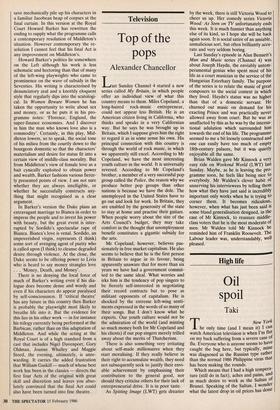Television
Top of the pops
Alexander Chancellor
Last Sunday Channel 4 started a new series called My Britain, in which people offer an individual view of what this country means to them. Miles Copeland, a long-haired rock-music entrepreneur, could not appear less British. He is an American citizen living in California, who thinks and speaks in a very Californian way. But he says he was brought up in Britain, which I suppose gives him the right to regard it as in some sense his own. His principal connection with this country is through the world of rock music, in which we apparently still excel. According to Mr Copeland, we have the most interesting youth culture in the world. It is universally revered. According to Mr Copeland's brother, a member of a very successful pop group called the Police, the reason why we produce better pop groups than other nations is because we have the dole. The unemployed in the United States have to go out and look for work. In Britain, they are enabled by the generosity of the state to stay at home and practise their guitars. When people worry about the size of the Arts Council's budget, they may take comfort in the thought that unemployment benefit constitutes a gigantic subsidy for the arts.
Mr Copeland, however, believes pas- sionately in free market capitalism. He also seems to believe that he is the first person in Britain to argue in its favour, being apparently unaware that for more than six years we have had a government commit- ted to the same ideal. What worries and irks him is the tendency of pop singers to be fiercely self-interested in negotiating their record contracts but to pose as militant opponents of capitalism. He is shocked by the extreme left-wing senti- ments expressed in the words of so many of their songs. But I don't know what he expects. Our youth culture would not be the admiration of the world (and minting so much money both for Mr Copeland and his clients) if our pop singers merely trilled away about the merits of Thatcherism.
There is also something very irritating about self-made millionaires when they start moralising. If they really believe in their right to accumulate wealth, they need not subsequently seek to justify their envi- able achievement by emphasising their contribution to the general good, nor should they criticise others for their lack of entrepreneurial drive. It is in poor taste.
As Spitting Image (LWT) gets drearier by the week, there is still Victoria Wood to cheer us up. Her comedy series Victoria Wood: As Seen on TV unfortunately ends this week. It is much funnier than anything else of its kind, so I hope she will be back again soon. It is social satire of an amiable, unmalicious sort, but often brilliantly accu- rate and very seldom boring.
Last Sunday's episode in Alan Bennett's Man and Music series (Channel 4) was about Joseph Haydn, the enviably untem- peramental genius who spent most of his life as a court musician in the service of the Hungarian Esterhazy family. The purpose of the series is to relate the music of great composers to the social context in which they lived. Haydn's status was no higher than that of a domestic servant. He churned out music on demand for his exacting Prince and was practically never allowed away from court. But he was as unaffacted by this as he was by the interna- tional adulation which surrounded him towards the end of his life. The programme seemed to me a bit loosely constructed and one can easily have too much of empty 18th-century palaces, but it was quietly enjoyable all the same.
Brian Walden gave Mr Kinnock a very easy ride on Weekend World (LWT) last Sunday. Maybe, as he is leaving the pro- gramme soon, he feels like being nice to everybody. Mr Walden's clever habit of unnerving his interviewees by telling them how what they have just said is incredibly important only works when he is trying to corner them. It becomes ridiculous, however, when what has just been said is some bland generalisation designed, in the case of Mr Kinnock, to reassure middle- class voters that he is the most moderate of men. Mr Walden told Mr Kinnock he reminded him of Franklin Roosevelt. The Labour leader was, understandably, well pleased.





































 Previous page
Previous page